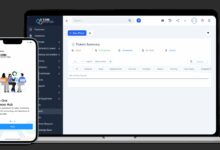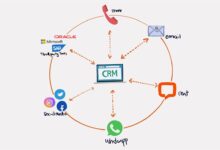Cloud Based CRM App: 7 Powerful Benefits You Can’t Ignore
Imagine managing all your customer relationships from anywhere, on any device, with real-time updates and zero downtime. That’s the magic of a cloud based CRM app—your business’s digital nerve center, always online and always working.
What Is a Cloud Based CRM App?

A cloud based CRM app is a customer relationship management system hosted on remote servers and accessed via the internet. Unlike traditional on-premise CRM software, which requires physical installation and maintenance, a cloud based CRM app runs on the cloud, enabling users to access data and tools from any location with an internet connection. This shift from local to cloud infrastructure has revolutionized how businesses manage customer interactions, sales pipelines, and marketing campaigns.
How It Differs from On-Premise CRM
Traditional CRM systems are installed directly on a company’s internal servers. They require significant upfront investment in hardware, software licenses, and IT staff for maintenance. In contrast, a cloud based CRM app operates on a subscription model, eliminating the need for physical infrastructure. Updates, backups, and security patches are handled automatically by the service provider, reducing the burden on internal teams.
- On-premise CRM: High initial cost, full control over data, complex upgrades
- Cloud based CRM app: Lower upfront cost, automatic updates, scalable, accessible from anywhere
According to Gartner, over 80% of CRM deployments in 2023 were cloud-based, highlighting the industry’s shift toward flexibility and scalability.
Core Components of a Cloud CRM System
A modern cloud based CRM app typically includes several integrated modules designed to streamline customer-facing operations. These include contact management, sales automation, marketing automation, customer service tools, and analytics dashboards. Each component works in harmony to provide a 360-degree view of the customer journey.
- Contact Management: Centralized database for leads, accounts, and communication history
- Sales Automation: Tools for tracking deals, forecasting revenue, and managing pipelines
- Service & Support: Ticketing systems, knowledge bases, and live chat integrations
“The cloud has democratized access to enterprise-grade CRM tools, allowing even small startups to compete with industry giants.” — Salesforce Blog
Top 7 Benefits of Using a Cloud Based CRM App
Adopting a cloud based CRM app isn’t just a tech upgrade—it’s a strategic move that can transform your business operations. From cost savings to improved collaboration, the advantages are both immediate and long-term. Let’s explore the seven most impactful benefits that make cloud CRM a must-have in today’s digital-first world.
1. Cost Efficiency and Predictable Spending
One of the biggest hurdles for businesses adopting CRM software has always been the high upfront cost. A cloud based CRM app eliminates this barrier by offering a pay-as-you-go pricing model. Instead of investing tens of thousands in servers and licenses, companies pay a monthly or annual fee per user.
- No need for expensive hardware or IT infrastructure
- Reduced maintenance and upgrade costs
- Scalable pricing based on team size and features needed
For example, platforms like Zoho CRM offer plans starting at $14/user/month, making it accessible for small businesses and startups. This financial flexibility allows organizations to allocate resources more efficiently.
2. Accessibility and Remote Work Enablement
In a post-pandemic world where remote and hybrid work models dominate, having a cloud based CRM app is no longer optional—it’s essential. Employees can access customer data, update records, and close deals from any location, whether they’re in the office, at home, or on the road.
- Access via web browsers or mobile apps
- Real-time synchronization across devices
- Support for global teams across time zones
This level of accessibility ensures that sales teams never miss a follow-up and customer service agents can respond faster, improving overall customer satisfaction.
3. Automatic Updates and Continuous Innovation
With on-premise systems, updating software can be a nightmare involving downtime, compatibility issues, and manual installations. A cloud based CRM app solves this by delivering updates automatically. Vendors push new features, security patches, and performance improvements seamlessly in the background.
- Always running the latest version without user intervention
- Frequent feature rollouts based on user feedback
- Compliance with evolving data protection regulations (e.g., GDPR, CCPA)
This means your team benefits from cutting-edge technology without lifting a finger—innovation comes to you, not the other way around.
4. Scalability to Match Business Growth
As your business grows, so do your CRM needs. A cloud based CRM app scales effortlessly. Whether you’re adding five new sales reps or expanding into new markets, cloud CRM systems can adapt instantly.
- Add or remove users with a few clicks
- Upgrade plans to unlock advanced features like AI analytics or workflow automation
- Handle increased data volume without performance degradation
For instance, Salesforce Sales Cloud allows businesses to scale from small teams to enterprise-level operations using modular add-ons.
5. Enhanced Data Security and Compliance
Many businesses hesitate to move to the cloud due to security concerns. However, reputable cloud based CRM app providers often offer superior security compared to on-premise solutions. They invest heavily in encryption, multi-factor authentication, intrusion detection, and regular audits.
- Data encrypted both in transit and at rest
- Regular third-party security certifications (e.g., ISO 27001, SOC 2)
- Disaster recovery and automated backups
According to a 2023 IBM report, cloud environments experienced 20% fewer data breaches than on-premise systems, debunking the myth that cloud is less secure.
6. Seamless Integration with Other Business Tools
A cloud based CRM app doesn’t exist in isolation. It’s designed to integrate with email platforms, marketing automation tools, e-commerce systems, and productivity suites. These integrations create a unified ecosystem where data flows freely between applications.
- Synchronize with Gmail, Outlook, or Microsoft 365
- Connect with Mailchimp, HubSpot, or ActiveCampaign for marketing
- Integrate with Shopify, WooCommerce, or QuickBooks for sales and finance
For example, integrating your CRM with Zapier allows you to automate workflows like creating tasks when a lead fills out a form—saving hours of manual work every week.
7. Real-Time Analytics and Business Intelligence
One of the most powerful features of a cloud based CRM app is its ability to deliver real-time insights. Dashboards display key performance indicators (KPIs) such as conversion rates, sales cycle length, customer lifetime value, and pipeline health.
- Visual reports with drag-and-drop customization
- Predictive analytics powered by AI and machine learning
- Exportable data for deeper analysis in Excel or BI tools
These insights empower decision-makers to act quickly, adjust strategies, and identify trends before competitors do.
How to Choose the Right Cloud Based CRM App for Your Business
Selecting the right cloud based CRM app requires careful evaluation of your business needs, team size, budget, and long-term goals. With dozens of options available—from simple tools for solopreneurs to complex platforms for enterprises—making the wrong choice can lead to wasted time and money.
Assess Your Business Needs and Goals
Start by identifying what you want to achieve with your CRM. Are you looking to improve lead conversion? Streamline customer support? Automate marketing campaigns? Define clear objectives before evaluating vendors.
- Map out your customer journey and pain points
- Determine which departments will use the CRM (sales, marketing, service)
- List must-have features vs. nice-to-have ones
For example, a B2B SaaS company might prioritize lead scoring and email tracking, while an e-commerce brand may focus on order history and customer segmentation.
Compare Key Features and Functionality
Not all cloud based CRM apps are created equal. Some specialize in sales automation, others in customer service or marketing. Compare core functionalities to ensure the platform aligns with your requirements.
- Contact and account management
- Lead and opportunity tracking
- Email integration and templates
- Task and calendar management
- Reporting and dashboard capabilities
Platforms like Pipedrive excel in visual sales pipelines, while HubSpot CRM offers robust free-tier functionality with excellent marketing tools.
Evaluate User Experience and Training Requirements
No matter how feature-rich a CRM is, it won’t deliver value if your team doesn’t use it. A user-friendly interface and intuitive navigation are critical for adoption. Look for platforms with clean dashboards, minimal clicks to complete tasks, and mobile app support.
- Check for onboarding tutorials and in-app guidance
- Assess the learning curve for non-technical users
- Look for vendors offering training resources or customer success managers
According to Nucleus Research, companies with high user adoption rates see up to 3x greater ROI from their CRM investments.
Top 5 Cloud Based CRM Apps in 2024
The market for cloud based CRM apps is crowded, but a few stand out due to their reliability, innovation, and user satisfaction. Here’s a breakdown of the top five platforms dominating the space in 2024.
1. Salesforce Sales Cloud
Salesforce remains the gold standard in CRM. Its Sales Cloud offers unparalleled customization, AI-powered insights (Einstein Analytics), and a vast ecosystem of apps via the AppExchange.
- Ideal for: Mid-sized to large enterprises
- Strengths: Scalability, AI features, third-party integrations
- Pricing: Starts at $25/user/month (Essentials plan)
Learn more at salesforce.com.
2. HubSpot CRM
HubSpot CRM is beloved for its ease of use and powerful free plan. It integrates seamlessly with marketing, sales, and service hubs, making it ideal for growth-oriented businesses.
- Ideal for: Small to mid-sized businesses, startups
- Strengths: Free tier, intuitive UI, marketing automation
- Pricing: Free plan available; paid plans start at $45/month
Visit hubspot.com for details.
3. Zoho CRM
Zoho CRM strikes a balance between affordability and functionality. It offers AI-driven sales assistant (Zia), workflow automation, and strong mobile capabilities.
- Ideal for: SMBs, remote teams
- Strengths: Cost-effective, multichannel communication, AI tools
- Pricing: Starts at $14/user/month
Explore at zoho.com/crm.
4. Microsoft Dynamics 365
For organizations already using Microsoft 365, Dynamics 365 offers deep integration with Outlook, Teams, and Excel. It’s a powerful choice for enterprise-level CRM and ERP convergence.
- Ideal for: Large enterprises, Microsoft-centric environments
- Strengths: Native Office 365 integration, advanced analytics
- Pricing: Starts at $65/user/month
More info at dynamics.microsoft.com.
5. Pipedrive
Pipedrive is built for sales teams that want a visual, pipeline-first approach. Its simplicity makes it perfect for small sales teams focused on closing deals.
- Ideal for: Sales-driven startups and small businesses
- Strengths: Visual pipeline, ease of use, mobile app
- Pricing: Starts at $14.90/user/month
Check it out at pipedrive.com.
Common Challenges and How to Overcome Them
While cloud based CRM apps offer immense benefits, implementation isn’t always smooth. Businesses often face challenges related to data migration, user adoption, and integration complexity. Recognizing these hurdles early can help you plan better and avoid costly mistakes.
Data Migration and System Integration
Moving data from spreadsheets or legacy systems into a new CRM can be daunting. Poor data quality—duplicates, missing fields, inconsistent formatting—can undermine the system’s effectiveness.
- Clean your data before migration
- Use CSV imports or API connectors for seamless transfer
- Test with a small dataset first before full rollout
Many vendors offer migration assistance or partner with third-party tools like Import2 to simplify the process.
User Adoption and Resistance to Change
Even the best cloud based CRM app fails if employees don’t use it. Resistance often stems from fear of complexity, lack of training, or perceived added workload.
- Involve end-users in the selection process
- Provide hands-on training and ongoing support
- Highlight personal benefits (e.g., easier task tracking, less manual work)
Leadership buy-in is crucial—when managers use the CRM consistently, teams are more likely to follow.
Customization vs. Simplicity Trade-Off
While customization can enhance functionality, over-customizing a cloud based CRM app can lead to confusion, slower performance, and higher maintenance costs.
- Start with default settings and evolve gradually
- Avoid unnecessary fields or workflows
- Document all customizations for future reference
Remember: the goal is to make work easier, not more complicated.
Future Trends Shaping Cloud Based CRM Apps
The evolution of cloud based CRM apps is far from over. Emerging technologies like artificial intelligence, automation, and low-code development are redefining what CRM can do. Staying ahead of these trends ensures your business remains competitive and customer-centric.
AI and Predictive Analytics
AI is no longer a futuristic concept—it’s embedded in modern CRM platforms. From lead scoring to sentiment analysis, AI helps teams prioritize actions and predict customer behavior.
- AI-powered chatbots for instant customer support
- Predictive lead scoring based on engagement patterns
- Natural language processing for email and call transcription
Salesforce Einstein and Zoho Zia are leading examples of AI-driven CRM intelligence.
Hyper-Personalization and Customer Experience
Customers expect personalized experiences. Cloud based CRM apps are leveraging data to deliver tailored content, product recommendations, and communication timing.
- Dynamic email content based on user behavior
- Personalized landing pages and offers
- Behavioral triggers for follow-ups
This level of personalization increases engagement and conversion rates significantly.
Low-Code and No-Code Customization
Businesses no longer need developers to tweak their CRM. Low-code platforms allow non-technical users to build workflows, forms, and automations with drag-and-drop tools.
- Create custom approval processes without coding
- Automate repetitive tasks using visual builders
- Empower marketing and sales teams to self-serve changes
This democratization of customization speeds up innovation and reduces dependency on IT.
Best Practices for Implementing a Cloud Based CRM App
Successful CRM implementation goes beyond software selection. It requires strategic planning, stakeholder alignment, and continuous optimization. Follow these best practices to ensure your cloud based CRM app delivers maximum value.
Define Clear Objectives and KPIs
Before going live, establish what success looks like. Are you aiming to reduce response time by 30%? Increase lead conversion by 20%? Define measurable goals to track progress.
- Set SMART goals (Specific, Measurable, Achievable, Relevant, Time-bound)
- Assign ownership for each KPI
- Use CRM dashboards to monitor performance monthly
Clear objectives keep the team focused and provide justification for the investment.
Start Small and Scale Gradually
Instead of rolling out the entire CRM to all departments at once, start with a pilot group—perhaps one sales team or a single location.
- Test functionality in a real-world setting
- Gather feedback and make adjustments
- Use early wins to build momentum for broader adoption
This phased approach minimizes risk and allows for smoother scaling.
Invest in Training and Ongoing Support
Even the most intuitive cloud based CRM app requires some learning. Provide structured training sessions, video tutorials, and quick-reference guides.
- Offer live onboarding webinars
- Create a knowledge base or internal wiki
- Designate CRM champions within each team
Continuous learning ensures long-term engagement and effective usage.
What is a cloud based CRM app?
A cloud based CRM app is a customer relationship management system hosted on remote servers and accessed via the internet. It allows businesses to manage customer interactions, sales, marketing, and support from any device with an internet connection, offering scalability, automatic updates, and lower upfront costs compared to on-premise solutions.
How secure are cloud based CRM apps?
Reputable cloud based CRM app providers implement robust security measures including data encryption, multi-factor authentication, regular backups, and compliance with international standards like GDPR and SOC 2. In many cases, they offer better security than on-premise systems due to dedicated cybersecurity teams and infrastructure.
Can I integrate a cloud CRM with my existing tools?
Yes, most cloud based CRM apps offer extensive integration capabilities with email platforms (Gmail, Outlook), marketing tools (Mailchimp, HubSpot), e-commerce systems (Shopify), and productivity suites (Google Workspace, Microsoft 365). Many also support API access and third-party automation platforms like Zapier.
Is a cloud CRM suitable for small businesses?
Absolutely. Cloud based CRM apps are ideal for small businesses due to their low entry cost, ease of setup, and scalability. Platforms like HubSpot CRM and Zoho CRM offer free or affordable plans tailored to startups and growing teams.
How long does it take to implement a cloud CRM?
Implementation time varies based on complexity, but many cloud based CRM apps can be set up in as little as a few days for basic use. A full deployment with data migration, customization, and training typically takes 2–8 weeks. Using a phased rollout can accelerate adoption and reduce disruption.
Adopting a cloud based CRM app is one of the most impactful decisions a modern business can make. From slashing costs and boosting productivity to enhancing customer experiences and enabling data-driven decisions, the benefits are clear and measurable. As technology evolves, these platforms will only become smarter, more intuitive, and more integral to business success. Whether you’re a solopreneur or leading a multinational team, there’s a cloud CRM solution ready to grow with you. The future of customer relationship management isn’t just in the cloud—it’s already there.
Further Reading:




